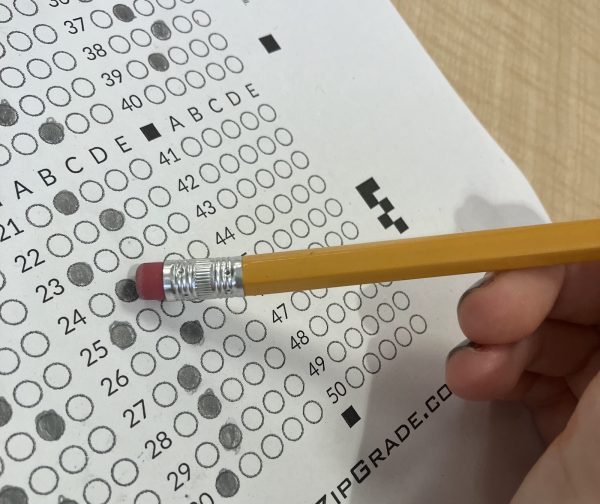
Just a few weeks before Oct. 16, the scheduled exam date for Franklin’s PreACT, it was suddenly canceled without immediate explanation. The assessment, which is contracted through ACT, Inc, an Iowa-based company, was recently purchased by the private equity firm Nexus Capital Management. While the previous company was a nonprofit, Nexus is a for-profit company. As a part of the restructuring, proceeds from the partnership between ACT and Nexus have been used to fund the continuation of a nonprofit; this nonprofit will be called IntermediaryEd. The change affected Oregon students around the state.
Officially, the Pre-ACT isn’t canceled, it’s delayed and will still be administered this academic year. According to Dan Farley, assistant superintendent of the Office of Research, Assessment, Data, Accountability, and Reporting (RADAR) for the Oregon Department of Education, “The company that provides the Pre-ACT, ACT, Inc., was bought by another company and changed its name to IntermediaryEd. Because of this, they had to update their paperwork with the IRS and the state of Oregon.” Now schools must wait for these updates to be approved to move forward with testing as planned.
State legislation, in section 329.488, mandates that a standardized test must be given to 10th graders to prepare them for college entrance exams. The test also must be given within a certain window of time. Last school year, the test had to be given between Oct. 2, 2023, and April 9, 2024. This year the deadline for the test will be extended to accommodate the delay.
This section also states that a nonprofit entity must administer the test. While IntermediaryEd is a nonprofit, Nexus’ status as a for-profit company has raised concerns with some regarding the involvement of private equity in the testing industry. Neither the Oregon Department of Education nor PPS has released an official statement to the public about Nexus Capital Management’s involvement as a for-profit corporation or about the postponement of the test. While PPS testing coordinators were informed in mid-September that the test could not proceed in October due to the name change, and administrators were told to reconfigure Oct. 16 as an instructional day, no information was shared widely with students, families, or staff about the change.
This occurrence isn’t the first change to the sophomore testing schedule in recent years. In the fall of 2023, Oregon switched from offering the Pre-SAT (PSAT) for sophomores to the PreACT. According to Franklin Vice Principal Alfredo Quintero, “For sophomores, the PreACT replaced the PSAT; however, the SAT remained unchanged for 11th grade students.” This shift was met with frustration from parents and students as they feared it wouldn’t adequately prepare them for the SAT that all PPS juniors take.
Additionally, juniors who wanted to try to become National Merit Scholars — a group of students who score well on the PSAT when taking it during their junior year — could no longer take the school-provided test along with the sophomores. While there are other options to take the test, they can be difficult to find and have to be paid for by students, which could leave Oregon with very few national merit scholars.
While practice tests like the PSAT and PreACT aren’t given to colleges, many schools require submission of either the SAT or ACT. Interruptions in testing due to COVID-19 led many colleges and universities to shift to test-optional applications. However, more and more colleges are now bringing back the requirement.
For example, Brown University, one of the most selective colleges in the country, announced last year that they will once again require test scores in their applications, as they feel the tests are more reliable indicators of a student’s future success than grades. This stands out as Brown is known to be less traditional than other elite schools such as Dartmouth, Harvard, and Yale, all of which have also returned to requiring the tests. Many Oregon schools including University of Oregon, Oregon State University, Reed College, and Lewis and Clark will remain test-optional. However, for many students, these pre-tests are just as important as they were pre-pandemic as schools bring back test requirements.


































Brooke DeNisco • Nov 2, 2024 at 8:03 pm
Throughout the country, public schools offer SAT/ ACT study groups, they actually practice for the same test they are going to take, and there are test dates offered in the fall for seniors who want to improve test scores. If you ask any school admin they say kids can sign up to take these tests out of school, easily. I was able to find one place a Franklin student could take the ACT and it’s in Corvallis at 8 am. The cost of the test is $95 plus gas and possibly hotel costs. Equity????